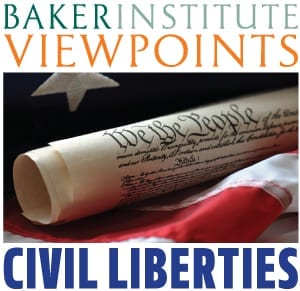 Legal scholars, activists, academics and law enforcement have all questioned the impact of the drug war on civil liberties. Many argue that like the prohibition of alcohol, the drug war has damaged civil liberties, particularly in the areas of search and seizure and the right to privacy. These issues could not be more timely given the changing landscape of drug policy in America. Pew and Gallup polls have indicated, for the first time, that a majority of Americans believe that marijuana should be legal. This sea change in public opinion is no doubt related to medical marijuana laws in 18 states and the District of Columbia and the legalization of marijuana for recreational uses by popular referendums in Colorado and Washington.
Legal scholars, activists, academics and law enforcement have all questioned the impact of the drug war on civil liberties. Many argue that like the prohibition of alcohol, the drug war has damaged civil liberties, particularly in the areas of search and seizure and the right to privacy. These issues could not be more timely given the changing landscape of drug policy in America. Pew and Gallup polls have indicated, for the first time, that a majority of Americans believe that marijuana should be legal. This sea change in public opinion is no doubt related to medical marijuana laws in 18 states and the District of Columbia and the legalization of marijuana for recreational uses by popular referendums in Colorado and Washington.
In the second of a four-part Baker Institute Viewpoints series, we ask: Will legalizing marijuana improve civil liberties?
America has lost its constitutional footing because of the war on drugs. More arrests equal more prosecutions, more convictions, more jails, and more police and prosecutors. The system benefits prosecutors, police and the prison industry.
Set out below are stark examples of our severe loss of civil liberties as a result of the War on Drugs.
Search and Seizure
Peace officers now have the right to strip search individuals in jail for even a minor offense such as a traffic violation. In April 2012, the U.S. Supreme Court declared that any person who is arrested and processed at a jail, regardless of the offense (i.e., they can be guilty of nothing more than a minor traffic violation), can be subjected to a strip search by police or jail officials, without reasonable suspicion. The U.S. Supreme Court’s 5-4 ruling disregards this significant overreach of state power and legitimizes an unreasonable intrusion upon a citizen accused of a crime.
If a peace officer alleges to “smell marijuana” then s/he has a right to perform a full body cavity search. A perfect example occurred when Angel and Ashley Dobbs were driving in Texas on July 13, 2012, and were stopped for allegedly littering by State Trooper David Farrell. After stopping the vehicle, Farrell claimed to have “smelled marijuana.” He interrogated the two women about the marijuana and searched their car. Trooper Farrell did not find any marijuana in the vehicle. However, the Dobbs police video clearly shows that they were subjected to a very public roadside body cavity search.
The incidence of police planting drugs on defendants seems to be on the rise. Barnes v. Camden is an example of an innocent man that was jailed for more than a year after police officers planted drugs on him. The officers were later implicated in a large-scale evidence planting conspiracy affecting nearly 200 Camden, N.J., residents.
Conditions of Bond
In Texas, when a citizen is arrested, allegedly innocent until proven guilty, conditions of bond are routinely imposed. This means that a defendant, although not convicted, must adhere to conditions of bond to remain free, even after posting bond. Conditions of bond can and often include: home curfew, electronic monitoring, drug testing on a weekly basis, reporting to a probation officer, paying probation fees, very restrictive limits on travel and limits on locations where the defendant may frequent.
A Texas magistrate has the power to require some defendants to provide a DNA sample purely for the purpose of creating a DNA record. Further, a Texas Court may revoke a bond and order the defendant arrested if the defendant violates any condition of bond, refuses any testing, fails to pay for testing, fails to pay for probation fees or tests “dilute” on any drug test (which can be caused by drinking water).
Assigned Counsel for Indigent Cases
Poverty also weakens a defendant’s access to justice and impedes one’s civil liberties. Many more drug cases are brought against the poor and racial minorities. African-Americans represent an alarming 62 percent of all drug offenders sent to U.S. state prisons, yet they only represent 12 percent of the U. S. population. Black men are sent to state prisons on drug charges at a rate that is 13 times that of white men. More than 25.4 million Americans have been arrested on drug charges since 1980; about one-third of them were black.
Many low income defendants utilize a court appointed attorney/assigned counsel for indigent defense to represent him/her when charged with a drug crime. However, unreasonably low rates of compensation are paid to court appointed attorneys who represent these indigent defendants in state courts, which can often lead to ineffective representation. The lack of even minimal funding limits the pool of attorneys willing to represent indigent defendants. Younger, less experienced attorneys are usually the ones that participate in the various assigned counsel systems for indigent defense across the United States. Assigned counsel representing indigent defendants are paid hourly rates far below the market value. These low hourly rates often lead these attorneys to accept more clients than they can effectively represent in order to make a living. Attorneys are forced to limit the amount of work they perform on a case for an indigent client as a result of perversely low compensation and large volume of cases. The result is often an inadequate, inexperienced, overworked and inherently conflicted lawyer working for a poor, uneducated client.
Inadequate Testing
The drug case defendant is also subjected to lengthy delays in the criminal justice system as a result of a lack of adequate testing facilities for the alleged illegal drugs. Crime labs in Texas and nationally face an ever-increasing backlog. For instance, the crime lab in Oakland, Calif., had a backlog of 3,500 cases, according to recent published reports. No national agency tracks backlogs or has standards for how quickly cases should move through a lab. It takes months to get even a small possession of marijuana case analyzed in many counties throughout Texas.
The War on Drugs has not only been a colossal failure, it has harmed the spirit and tenets of the framework of our freedom and liberty: the U.S. Constitution. Search and seizure, conditions of bond, assigned counsel, and inadequate testing are only a few areas that have been instrumental in corroding our system of justice as a result of the drug war. Further damage to our culture, our independence and system of justice must stop. We must end this ill-conceived policy before it causes more harm to our country and civil liberties, and to Americans.
 Gilbert G. Garcia is a board certified criminal lawyer in Conroe, Texas. He is a member of the State Bar of Texas Criminal Justice Section and Individual Rights & Responsibility Section; the Texas Board of Legal Specialization – Criminal Law; Texas Criminal Defense Lawyers Association; National Association of Criminal Defense Lawyers; College of the State Bar of Texas; The National College for DUI Defense, Inc.; and The National Organization for the Reform of Marijuana Laws (NORML).
Gilbert G. Garcia is a board certified criminal lawyer in Conroe, Texas. He is a member of the State Bar of Texas Criminal Justice Section and Individual Rights & Responsibility Section; the Texas Board of Legal Specialization – Criminal Law; Texas Criminal Defense Lawyers Association; National Association of Criminal Defense Lawyers; College of the State Bar of Texas; The National College for DUI Defense, Inc.; and The National Organization for the Reform of Marijuana Laws (NORML).